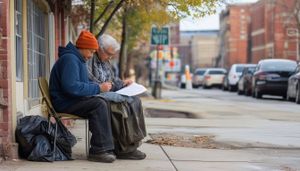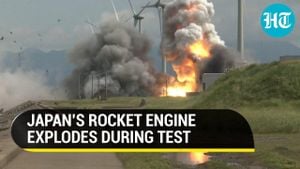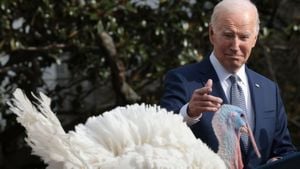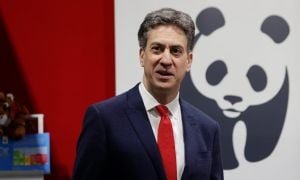Montreal recently witnessed significant unrest during pro-Palestinian protests, coinciding with the NATO summit held in the city. What started as organized student strikes advocating for solidarity with Palestinians quickly escalated, leading to chaos and violence spread across various parts of the city. Approximately 85,000 students from multiple universities, including notable institutions like McGill and Concordia, joined together to demand divestment from Israel and called for what they termed 'intifada', invoking alarming historical references such as the 'final solution'—a term associated with the Holocaust.
The protests quickly intensified, particularly on the second day, as masked demonstrators vandalized properties, set cars ablaze, and clashed violently with police. Riot police were deployed to manage the growing chaos, but the situation repeatedly spiraled out of control, resulting in widespread destruction and assaults. Eyewitness accounts depict scenes of broken windows, smoke bombs exploding, and confrontations between protesters and law enforcement.
During the height of the protests, Mayor Valérie Plante described the events as 'shocking' but faced criticism for her perceived lack of decisive action against the demonstrators. Some called for stronger measures against the vandalism and violence, emphasizing the need for more active responses from local officials and law enforcement authorities.
Prime Minister Justin Trudeau's response to the situation came only the day after the protests had caused significant disruptions. While he condemned the violence, emphasizing the importance of free speech, he reiterated there is no place for antisemitism or violence within Canadian society. He stated during his address, "We expect all those responsible to be pursued and punished under the full extent of the law, and we expect the authorities to do their work." His remarks came as he was attending the NATO Parliamentary Assembly, leading to speculation about the government's engagement with the crisis.
The protests were met with varied responses from community members and organizations. Jewish advocacy groups expressed their concern over the violent rhetoric and actions of some protesters, viewing the protests as not only disruptive but dangerously inflammatory. Jewish student groups at local universities condemned the rhetoric surrounding these protests, arguing it promotes hostility and division. Leon Novodvorets, a Jewish student at McGill University, expressed disappointment at the university's handling of the situation, stating, "They have fallen immensely short" in ensuring the safety of Jewish students during such events.
Social media played a pivotal role during these protests, both as a platform for organizing and denouncing the actions taken by demonstrators. Various activist groups utilized these channels to call for canceling events associated with pro-Israel speakers—such as one featuring Mosab Hassan Yousef, which was canceled amid threats and violence. Requests for cancelation were fueled by fears among some groups of potential violent backlash against such discussions.
The unrest sparked discussions surrounding the university's policies on controversial speakers, and whether their decisions were influenced by external pressure rather than internal guidelines. The boiling tensions on campus reflect the larger societal divisions perceived throughout Canada and other parts of the world related to the Israeli-Palestinian conflict.
On the ground, protesters on the second day of demonstrations engaged heavily with law enforcement, using public spaces to express their anger over perceived injustices. Social media footage captured the moments when police forces struggled to manage protest crowds as they chanted slogans and utilized incendiary devices.
While the protests primarily concentrated on advocating Palestinian rights, they also drew attention to the perceived injustices faced by Jewish communities amid rising antisemitism. The backlash against governmental and institutional responses to harassment from both sides of the Israeli-Palestinian conflict points to the increasing polarization of public opinion.
The escalation of such protests raises questions about public safety and the balance between freedom of expression and the potential for violence. Critics argue the government and institutions need to reassess how they manage such protests to prevent similar incidents from recurring.
Despite the alarming observations during the protests, the community response continues to evolve. The discussions following these events echo larger conversations about societal divisions—discussions shaped by deeply ingrained historical grievances and political ideologies.
More than ever, the Montreal protests serve as potent reminders of the complex interplay between freedom of speech, social justice, and the need for civic order amid rising tensions surrounding contentious global issues.



